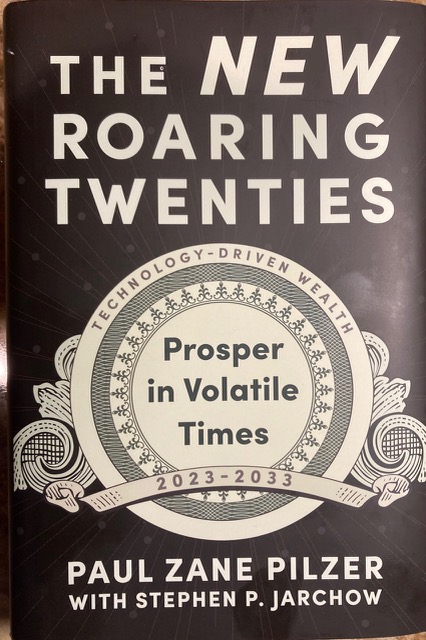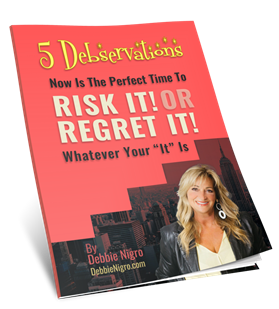A.I. In America, Everything from Celebrity Likenesses to Officiating Over Weddings & More is happening very quickly. You have seen references to A.I Technology in the media almost every day. Most recently with regard to the announcement of actor, Bruce Willis, allowing his A.I. likeness to be used by Deepfake in a commercial venture and potential films.
And, also recently the ruling in Denver, Colorado that couples can use an artificial intelligence bot as their officiant, while other countries have banned the idea.

“The NEW Roaring Twenties” Prosper In Volatile Times, is an insightful guide to surviving and prospering in the NEW roaring twenties.
Written by Paul Zane Pilzer, author of 13 New York Times best-selling book in 25 languages, and Stephen P. Jarchow, who has been involved in the production and distribution of over 250 films and TV series, resulting in two Academy Awards and five Emmy nominations, they have come together to shine a light on one of the hottest topics today in the news and affecting the world today – A.I. Technology.
As exciting and futuristic as this all sounds, authors Pilzer and Jarchow contend that our civilization faces a very real danger from “zero-day” cyber-attacks and manipulative algorithms.
What should the public know?

Stephen P. Jarchow dropped by The Debbie Nigro Show to tell you what he knows about AI, that he feels you should know about, in this podcast of our live radio conversation.
If you’d rather read about what Stephen had to say the audio transcript of our conversation is below.
ABOUT THE AUTHORS
Paul Zane Pilzer is an economist, social entrepreneur, and the New York Times best-selling author of 13 books published in 25 languages. He graduated from Lehigh University in three years and received his MBA from the Wharton School in 15 months. He became Citibank’s youngest office at age 22 and its youngest vice president at 25 and became an adjunct professor at New York University at age 24 where he was voted “best teacher” five times. Pilzer served as an appointed economic advisor in two White House administrations and has started and/or taken public six companies. His career has been featured in more than 100 publications, including on the front page of the Wall Street Journal. Sam Walton, the founder of Walmart, once said that he was “amazed at Pilzer’s business capacity and his ability to put it into laymen’s terms.”
Stephen P. Jarchow received his BBA, MS and JD from the University of Wisconsin. He has been involved in the production and/or distribution of over 250 motion pictures and television series. Jarchow’s films have won two Academy Awards. He has been nominated for five Emmy Awards, winning in 2021 for “Girls Voices Now.” Jarchow has been a principal in more than 100 real estate ventures and is the author of five books on real estate finance.
***************************************************************************
AUDIO TRANSCRIPT
0:00:00
And now, back to the Debbie Nigro Show!
3
0:00:03
Hi guys, welcome back to the Debbie Nigro Show. Really a pleasure always to be with you guys As all you’re over there and I’m over here all the time, you know Pretty soon we’re gonna, I don’t know, artificial intelligence Will somehow get you involved with things you never got involved with…
1
0:00:30
Or get other people involved. And I I don’t like the idea of cloning myself into an artificial intelligence version or making a version of me They’re doing that you know. Taking people’s voices like my own and saying okay. We’ll make you do commercials We’ll just give us your voice, and we’ll do what we want with it. I don’t like it But lots of likenesses are being used in commercial ventures one of which I put brought up earlier in the show, Bruce Willis, allowing his artificial intelligence likeness to be used in a commercial venture and potential films. My gosh, right? There are a lot of celebrity likeness stories. I even put up an artificial intelligence wedding ceremony. I was like, what? Yeah, there’s a bot, you know, B-O-T, officiating a wedding, and it’s in a little video, I think the first one I’ve ever seen, that I put up on my Debbie Nigro Show Facebook page. Anyway, you’re hearing a lot about artificial intelligence technology in the media, you’re hearing every day. So yeah, there’s a book out, it’s called The Roaring New 20s, okay, The New Roaring 20s, The New Roaring 20s. It’s a guide that we might all benefit from reading. It’s all about surviving and prospering during these crazy times. And it was written by Paul Zane Pilsner, author of 13 New York Times bestselling books in 29 languages. I don’t know how people do this. And Stephen Jarchow, who’s been involved in the production and distribution of over 250 films and television shows and series. He’s had a couple of Academy Awards, five Emmy nominations. So together they sat and they said, okay, we have to talk about this. It’s one of the hottest topics today in the news. It’s affecting the world. And yes, it sounds exciting. Yes, it sounds futuristic. But they are a little worried that we face as a civilization a pretty big danger from some things we haven’t even thought about yet. Cyberattacks, manipulative algorithms. I mean, you know, it’s crazy, right? So what should we as the public know? And I’ve invited Stephen to join me on the show today. We have Stephen Bobby on the line.
5
0:02:57
Yes, we do.
1
0:02:58
Hello, Stephen.
4
0:02:59
Hello.
2
0:03:00
How are you doing?
1
0:03:02
Very nice to meet you. How are you?
2
0:03:04
I’m fine. Just so you know, the title is The New Roaring Twenties. You had it right the first time.
1
0:03:11
Yes, I’m The New Roaring Twenties. Prosper in volatile times, technology driven wealth. It’s fantastic and I’m very happy to have you. You spent a lot of time talking about this and writing this together, which must have been an intense time for you. You maybe want to talk about actually writing something like this.
2
0:03:32
Well, Paul and I have known each other for 40 years, since 1982, and we’ve been good friends and we’ve participated together in investments in this country and overseas, particularly in Russia in the 1990s, and really know each other pretty well and exchange ideas and enjoy each other’s company. Paul had decided to write this book when his children, he has four, decided to ask questions about what the future, the next ten years will hold, particularly with respect to technology and artificial intelligence. Paul was ill last year and he and his wife called me and asked me if I would finish the book for him, which I worked on for about three or four months pretty intensively. The work you have in front of you is the result. It was a labor of love because Paul has been my great friend and also it was an opportunity to communicate some thoughts on subjects that are going to impact all of us over the next decade.
1
0:04:58
First of all, I’m very sorry that he was not well and my thoughts and prayers to him. You as a good friend and obviously a confidant of his, amazing that you jumped in on this, but it’s always really fabulous when you have somebody you can talk to about big ideas and not everybody has that. So you are bringing a perspective to people who don’t have somebody like you or Paul to talk to about this. If you had to throw out one key thought that comes to mind in the beginning of questions that have been posed or the public might want to know, what do you want the public to know? What’s the first thing you want the public to know about what is going on that you guys know?
2
0:05:41
Well, if I may, let me suggest two things that seem to be top line stories. The first is that technology, particularly technology with artificial intelligence, is going to change pretty much everything we do and the way we live our lives. It’s going to create great wealth. It’s also going to create a stratification where people who have trained themselves and have experience with technology and artificial intelligence will benefit more than those who do not. The related point is that artificial intelligence is something that has been around since the 1950s, and it’s a part of our everyday life already in that we use every day a number of AI applications, web search engines like Google search, recommendation systems for YouTube, Amazon, Netflix. We use AI to understand human speech with Siri and Alexa. We have self-driving cars to a certain extent. And then, most recently, chat to GPT and its ability to begin to create content. And this is what is called generative AI, which uses large language models, that is access to hundreds of millions or even more data points in order to actually create content and relay that content in text, code, and images. So this is a dramatic step forward and it’s going to accelerate the rate of change significantly so that things that typically took five to ten years will now probably take less than a year.
1
0:07:50
Wow. I would like to ask you a question. I want to jump in on this because of your background.
2
0:07:55
Please jump in.
1
0:07:56
Yes, because of your background, I don’t know many people who have made as many films as you have made, or TV series, 250. When I brought up Bruce Willis, allowing his artificial intelligence likeness to be used in a commercial venture, maybe some films, he’s probably not the only person who has been approached for this. What is your feeling about this concept?
2
0:08:23
It’s going to be a fascinating area. The law at this point is somewhat ambiguous. There is a right of publicity to your image, which has value and so can be licensed, much as Bruce’s family has done. That’s going to be of value where it becomes a little more ambiguous is what about lesser-known actors or extras, you know, can their images be used using AI to, you know, create a crowd scene, create a situation, and what about an actor who performs in and AI is used to manipulate what they say or what they do. How is that dealt with and what are the legal implications? And the honest answer to your question is no one knows really at this point. We do know that there’s a right of publicity, there’s a right of privacy and there is law related to that, but these are areas that are ambiguous and kind of a gray space. So we’re going to see a lot of litigation related to this, a lot of conversations. Screen Actors Guild in particular view this as a priority and they are working to establish their own guidelines for their personnel. And this is one of the areas that’s being discussed and negotiated in the current labor strife that exists where the radio guild and the screen actors guilds are both on strike.
1
0:10:24
go up in strike. Yeah, they have to get ahead of this. It’s absolutely necessary based on how fast things are moving that there have to be some rules put in place in advance or this whole thing is just going to go haywire and you know as it is it’s a tough industry for people to break into and get a chance in films and television series and if there’s artificial intelligence replacing the few jobs that get you know at any given time that is very uncool so I think I think that’s great news. Talk about the yeah there’s an upside there’s a downside hopefully technology with artificial intelligence is changing our time on this planet as humans for the better but there are some dark possibilities okay that pose extreme risks and you even point out that artificial intelligence has the potential to be deadly. I really don’t want to hear that, but go ahead.
2
0:11:16
It is depressing to hear. You know, we live in a world where there’s all sorts of things going on that are a little anxiety provoking and this just adds to it and perhaps is the seminal worry of the next decade. On the positive side, briefly, artificial intelligence is going to speed up and replace a lot of repetitive work. There’s going to be tremendous applications from a medical standpoint. It’s going to assist us in protecting our infrastructure, the power grid, and air traffic controllers. It will help with simulations, models, drugs, molecular combinations, forecasting, all sorts of things that are going to be positive. But on the other hand, it’s a dual-purpose technology, which is true of a lot of things. We humans are sort of dual-purpose. We can do good or bad. fire, atomic energy, all of these things are dual purpose. Algorithms make mistakes, and we’ve already seen the issues related to social media and the corrosive effect that that has had on our democracy and our ability to understand understand what is really going on in the world and social media is sort of an early and kind of unsophisticated form of artificial intelligence. Right now, our military and the military of most other countries is weaponizing artificial working around the clock, very aggressively, to create autonomous weapons systems, whereby the decision to fire, kill someone, is going to be, or to drop a bomb, is going to be determined by an algorithm.
1
0:13:31
Unfortunately, boy, Stephen, I want to read your book and I will read it all the way through. I hope everybody listening will read it as well. It’s really kind of fascinating. The New Roaring Twenties, well thought out. Prosper and Volatile Times, it sounds like the upside is to read the book. Technology Driven Wealth, Paul Zane Pilsner and Stephen P. Jarchow. Thank you so much, Stephen. I really wish we had more time together, but you can come back any time. I really wish we had more time together, but you can come back any time. My pleasure.



